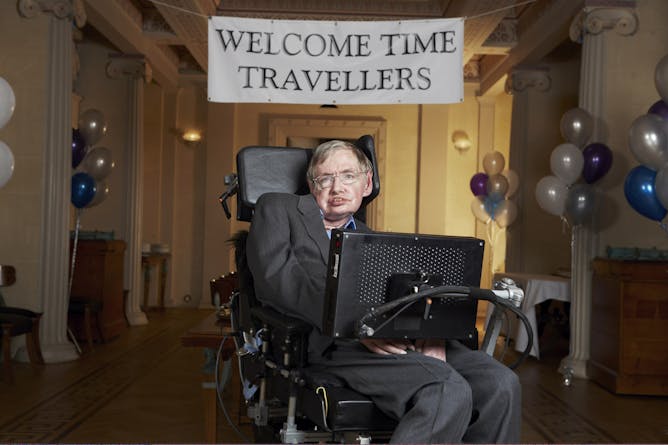| |
|
|
|
|
|
|
| |
|
Editor's note
|
|
Acclaimed British theoretical physicist, cosmologist and author Stephen Hawking has died aged 76. We’ve prepared a timeline of his remarkable life.
Hawking was an intellectual giant. His ideas and theories led to new scientific views of the universe, black holes and the very nature of matter.
But it wasn’t just scientists who benefitted from Hawking’s brilliant mind. His non-fiction writing, known best through the book A Brief History of Time, was enjoyed by millions of ordinary people.
After a diagnosis at the age of 21, Hawking had lived and worked another 55 years with motor neurone disease. Today Australian academics pay tribute to his work and life.
|
Sarah Keenihan
Section Editor: Science + Technology
|

|
|
Top story
|

Stephen Hawking at Gonville & Caius College, Cambridge in 2015.
lwpkommunikacio/flickr
Michael Courts, The Conversation; Sarah Keenihan, The Conversation
Hawking's most famous book, A Brief History of Time, sold 10 million copies and was translated into 40 languages, skyrocketing to the top of the bestseller lists in the US and UK.
|
Science + Technology
|
-
Alan Duffy, Swinburne University of Technology; Alice Gorman, Flinders University; Jonti Horner, University of Southern Queensland; Lisa Harvey-Smith, CSIRO; Matthew Bailes, Swinburne University of Technology; Steven Tingay, Curtin University
Stephen Hawking inspired people with his work on black holes and other mysteries of the universe. Many were quick to pay tribute to the theoretical physicist who died today in the UK, aged 76.
-
Andreea S. Calude, University of Waikato
Spoken language evolves differently and faster than written language, and there are good reasons why this is the case.
|
|
Politics + Society
|
-
Howard Manns, Monash University; Kate Burridge, Monash University
Irish influence on Australian English is much like the influence of the Irish on Australians themselves — less than you’d expect on the surface, but everywhere once you start looking.
-
Andrew Markus, Monash University
Most surveys are consistent in finding there is a substantial minority of the view that immigration is too high, but not a large majority.
-
Laura D'Olimpio, University of Notre Dame Australia
In order to to combat the decline of trust in civil society, we need to cultivate global citizens who are able to thrive in an increasingly diverse and globalised world.
|
|
Cities
|
-
Robert Freestone, UNSW; Elizabeth Taylor, RMIT University; Julian Bolleter, University of Western Australia
Business-as-usual projections assume our four biggest cities must absorb three-quarters of Australia's population growth over the next 30 years. Might new cities be a better way to deal with it?
-
Nicole Gurran, University of Sydney; Bill Randolph, UNSW; Peter Phibbs, University of Sydney; Rachel Ong, Curtin University; Steven Rowley, Curtin University
The clichés about housing supply and regulatory restraints are distractions from the need to focus on expanding the affordable housing sector to directly meet the needs of low-income households.
-
Jago Dodson, RMIT University
The first IPCC conference on cities has highlighted the challenges of reconciling science, urban practices and politics. But it was an important recognition of cities' leading role in climate action.
|
|
Arts + Culture
|
-
Kristyn Harman, University of Tasmania
In the early days of colonial Tasmania, the British used threatening picture boards to communicate with Aboriginal people, giving them a choice between conciliation and death.
-
Julian Meyrick, Flinders University
The Great War uses scale models to give a worm's eye view of titanic violence. In Kings of War, by contrast, lethal events are viewed from the unsteady perspective of leaders.
|
|
Education
|
-
Gavin Moodie, RMIT University
Despite serious financial and enrolment pressure for some, our universities are unlikely to close their doors – but some may have to resort to being 'merged' or taken over by a stronger partner.
|
|
|
|
Business + Economy
|
-
Patricia Baum Salgado, Fielding Graduate University
Research has found Silicon Valley engineers feared speaking up when they recognise poor behaviour among their male colleagues.
-
Anna Olijnyk, University of Adelaide
The Financial Services Royal Commission can ask the banks for the material it wants, in the form it wants.
|
|
Health + Medicine
|
-
Hannah Dahlen, Western Sydney University; Charlene Thornton, Western Sydney University
Women often express a fear of giving birth en route to the hospital, and these fears have some basis.
|
|
| |
Featured jobs
|

|
The Conversation AU — Parkville, Victoria
|

|
University of Melbourne — Parkville, Victoria
|

|
|

|
The Conversation US — New York, United States
|
|
|
|
Featured events
|

|
Deakin Downtown, Level 12, Tower 2, Collins Square, 727 Collins Street, , Docklands, Victoria, 3008, Australia — Deakin University
|

|
Nicholson Museum, The Quadrangle, The University of Sydney, Sydney, New South Wales, 2006, Australia — University of Sydney
|

|
19 Ancora Imparo Way, Clayton Campus, Victoria, 3800, Australia — Monash University
|
|
|
1 Convention Centre Pl, South Wharf, Melbourne, Victoria, 3006, Australia — Melbourne Convention and Exhibition Centre
|
|
|
|
| |
| |
| |
| |
| |
|
|
|
|
|
|
|
|